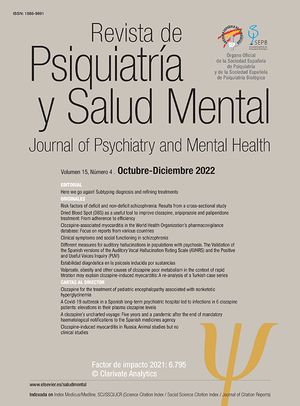Research into bipolar disorder is underfunded, both by public organizations and private industry, mainly, among other reasons, because in almost all cases it constitutes a secondary drug indication, after schizophrenia, depression, or epilepsy.10 Nevertheless, the good news is that there is still progress being made as shown in this issue of the Spanish Journal of Psychiatry and Mental Health. Entering the era of Precision Psychiatry, the combination of clinical data with neuroimaging can help estimate the risk of manic relapse.7 Besides the progress in understanding the importance of genetics, we also learnt that environmental factors, distress and lifestyle play also their role in the pathophysiology of the disease8; 9. Advances in psychopharmacology move slowly in this field, as mentioned, but now we know that lamotrigine is efficacious in women with bipolar disorder at childbearing age, and seems much safer than drugs as valproate or topiramate in this population,11 due to teratogenicity factors. Lumateperone has become the second drug to have positive evidence for use in bipolar II depression, after quetiapine.6 Drugs used for treatment-resistant depression, such as esketamine, may also help patients with bipolar depression,2 and, believe it or not, antidepressants seem to have protective effects against depressive relapse over the long term in bipolar depressed acute responders.12 This finding is particularly relevant because it reflects clinical practice and sheds light into a long-standing debate.4 Moreover, progress is being made also in the field of psychosocial interventions for bipolar disorder,1 despite some negative results.3
How can we move the field even forward? Besides more and better funding, a global, multidisciplinary and longitudinal effort is necessary.5 We need better animal models and better understanding of the neural underpinnings of the bipolar switch process, and we need to work much further on the phenotype and its connection with biomarkers. Digital tools and artificial intelligence will provide new opportunities to enrich the association between behaviour and biological correlates. For this purpose, a large, international, representative cohort of patients with bipolar disorder, followed longitudinally with common tools for a long period of time, will be necessary. Emphasis will be also needed in early detection and intervention, working in high-risk populations and identifying the biopsychosocial predictors of transition into the full syndrome. Moreover, changes in the way drugs are approved and authorized to go to the market, including reimbursement policies, may need to be revised to create incentives for further innovation in psychopharmacology for indications as bipolar disorders. And beyond expanding the pipelines, clinicians need to know better how to use the current armamentarium through head-to-head, large pragmatic studies to inform the guidelines and clinical practice. Other biological treatments, such as neuromodulation techniques, hold a lot of promise bur need an extra effort in proving their efficacy, and the same applies to psychological interventions.
All the potential progress described above will be much less meaningful if the scientific advances do not reach everybody. Precision psychiatry will transform the way we diagnose and treat mental disorders but runs the risk of being useful for the rich only. The practice of psychiatry will become increasingly expensive and hardly affordable for public health care systems. Disparities, which are already huge, may skyrocket. Therefore, a parallel effort in providing health care access to everyone is paramount, and escalating scientific advance into sustainable procedures should be a political priority.
Looking back, it is undeniable that patients are doing much better nowadays than 30 years ago in the majority of countries. We know more than ever about the neurobiology of bipolar disorders and we are in the path of increasing the process exponentially. Those who deny this might have not seen patients during their career, adopting a sceptical or even cynical academic position. But the way forward is windy and full of hurdles. This is just a humble but hopeful statement in favour of scientific ambition and human values in the context of research into a condition that not only has brought suffering and disability to many, but also creativity, leadership and diversity to our society.
Conflict of interestEV has received grants and served as consultant, advisor or CME speaker for the following entities: AB-Biotics, AbbVie, Adamed, Angelini, Biogen, Biohaven, Boehringer-Ingelheim, Celon Pharma, Compass, Dainippon Sumitomo Pharma, Ethypharm, Ferrer, Gedeon Richter, GH Research, Glaxo-Smith Kline, HMNC, Idorsia, Johnson & Johnson, Lundbeck, Medincell, Merck, Novartis, Orion Corporation, Organon, Otsuka, Roche, Rovi, Sage, Sanofi-Aventis, Sunovion, Takeda, and Viatris, outside the submitted work.
EV thanks the Instituto de Salud Carlos III; the CIBER of Mental Health (CIBERSAM); the Secretaria d’Universitats i Recerca del Departament d’Economia i Coneixement (2021 SGR 01358), the CERCA Programme, and we thank the University of Barcelona for the Open access of this paper.







